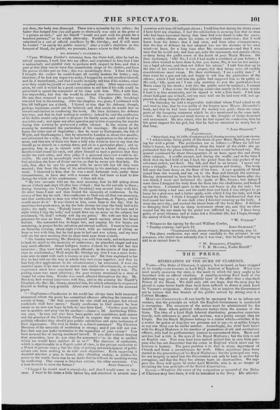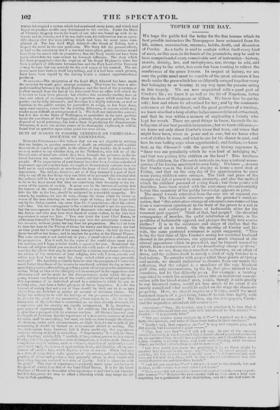RESIGNATION OP THE DUKE OF CLARENCE.
THE PRESS.
TIMES.—The Duke of Clarence, it appears, has resigned, or been stripped of, his briefly-worn honours as Lord High Admiral of England. What now most nearly concerns the state, is the mode in which the navy ought to be furnished with an official chieftain. A steadily-working First Lord of the Admiralty may prove a more profitable head of the office than a slap-dash Prince of the Blood. We shall only add our hope, that the navy may be placed in some better hands than have been suffered to direct it since Lord St. Vincent's resignation. Above all things, let us implore the Government not to torture that fine branch of the public service by setting over it a Cabinet Minister.
MORNING CHRONICLE.—It can hardly be necessary for us to inform our readers, that the principle on which the English Government is conducted is corruption. The resources of the nation must be administered for the benefit of those whose political influence makes them the masters of the State. The idea of a Lord High Admiral distributing promotion conscien- tiously, with reference to merit and services, was a pretty enough idea for Utopia. But his Royal Highness belongs to a nation which—whether it be a matter for praise or dispraise we presume not to say—is as unlike Utopia as any one thing can be unlike another. Accordingly, the chief fault found with his Royal Highness is his number of promotions of old and meritorious officers, who had no parliamentary interest to recommend them. Merit and services had a title in the eyes of his Royal Highness ; but the title is not an English one. That man must have looked around him to very little pur- pose who has not discovered that the crime in England which never can he forgiven is honesty. The great problem is to find in every department of Church and State a succedaneum for truth. Other objections have been started to the proceedings of his Royal Highness; but the principal one was, his not keeping in mind that the Government can only be kept in motion by corruption, and that the Navy has always been its sheet-anchor. We sup- pose the Navy will again be under Lord Melville, who is in no danger of mistaking the trne principles of the British Constitution. GLOBE.—Whatever the cause of the resignation or removal of the Duke of Clarence may have been, it will be lamented in the Navy. His adminis-
tration interrupted a system which had continued many years, and which had begun to produce results very detrimental to the service. Under the Duke
of Clarence thesnavy wash) the hands of one who was bound up with its in-
terests and its honour, and if he was indiscreet, his indiscretion was an agree- able change after the wary jobbing which had been for many years com- plained of. The late Lord High Admiral—the friend of Nelson, had a respect for merit in his own profession. The Navy felt the present effects, as well as the conviction that if a war had taken place, public services would have been the surest title to promotion; that the Navy would not have been again infecteck to the same extent by borough influence. The story which has been propagated—that the expense of his Royal Highness's tours has been a subject of difference between hint and the First Lord of the Treasury —may be true, but can scarcely be the real cause of his removal. The ex- pense must have been in itself very trilling, and if it had been much greater, must have been repaid by the activity which a vigilant superintendence produces.
STANDARD.—The resignation of the Lord High Admiral has been made the occasion for much gross misrepresentation. That there has been a mis- understanding between his Royal Highness and the head of the government is clear enough front the fact of his retirement from an office with which he is known to have been pleased ; but whether this misunderstanding does or does not admit of accommodation, is a question upon which none but the parties can be fully informed ; and therefore it is highly indecent, as well as injurious to the public service, for journalists to assign, as has been done, upon mere surmise, causes for the existing difference, to canvass which may render more difficult an arrangement of it. We shall not imitate this coin-se; but it is due to the Duke of Wellington, to contradict in the most positive terms the assertions of the Opposition journals, that general politics, or the disposal of naval patronsge, has had a share in producing the disagreement. Whenerer, if ever, the matter comes to be thoroughly explained, it will be found that no question upon either point has ever arisen.
DUTY OF JUDGES IN PASSING SENTENCE ON CRIMINALS.— DOCTRINE OF REPENTANCE.
Moto:tern CHRONICLE—We believe that we are not singular in wishing that our Judges, in passing, sentence of death on criminals, would confine theinselvets as much as possible to the affairs of this world ; for it would be no easy matter to say whether they, or the Methodists, who tell us of the blessed state of mind into which they have brought the prisoners in the in- terval between the sentence and its execution, do most to demoralize the people. PY the expectation of punishment hereafter be a doctrine calculated to promote upright conduct here, we ought to be extremely cautious how we hold out to such criminals as murderers the hope of their salvation by their repentance. The Judges, however, act as if they deemed it a part of their duty to say all the fine things they can think of to persuade the criminal that the gallows will be but a step in the ascent to heaven. They do not seem to be in the least aware that they are exercising their humanity at the ex- pense of the morals of society. It never can be the interest of society that the horrors of the situation of the murderer, or any other criminal who for- feits his life to the law, should be mitigated by a mawkish sympathy. We cannot, by anything we can do here, change the down either for better or worse of the man entering on another stage of being; and the hopes held out by the judge cannot, any more than his denunciations, affect the crimi- nal's fate. But the consequence to the criminal himself is not the question ; but the consequence to the hundreds of thousands who read what hills front the Judge, and who may have their dread of crime shaken, by the idea that repentance is never too late. " You sent (said the Lord Chief Baron, in addressing himself to William Corder)—you sent this unfortunate woman to her account, without giving her any tune for preparation. She had no time to turn her eyes to the Throne of Grace for mercy and forgiveness; she had no time given her to repent of her many transgressions ; she had no time to throw herself on her knees, and to implore for pardon at the Eternal Throne. The same measure is not meted out to you ; a small interval is allowed you for preparation. Use it well, for the scene of the world closes upon you ; but another, and I hope a better world, is opening for you. Remember the lessons of religion which you received in the early years of your childhood; consider the effects that may be produced by a sincere repentance ; listen to the ads ice of the ministers of your religion, who will, I trust, console and advise you how best to meet the sharp ordeal which you must presently undergo." His Lordship evidently believes that the prospects of Corder arc much better than those of the woman he murdered, and that the day or two at most of preparation allowed him, give him a great advantage over his unfortunate victim. What an idea of the Almighty is here conveyed in the supposition that allowance will not be made for the circumstances under which this poor young woman was hurried out of the world, and that the brief and question- able repentance of at individual placed in a situation in which he can do nothing else, gives him a better prospect of future happiness. It is for the interest of society that not a ray of hope should be held out to these men whose lives are forfeited to justice on account of atrocious crimes. The .fudge has mulling to cin with the feelings or the prospects of the criminal ; he acts for the good of the community, whose organ he is. As far as the future fate of the individual is concerned, as we have already observed, his compassion and his severity are equally unimportant. It is, therefore, a pure piece of supererogation. He is not called on, like a Catholic priest, to give him a passport with his extreme unction. All Divines have not gone the length of declaring that the repentance of a man under sentence of death fur crime shall be unavailing; but most, we believe, have thought the chance of ealvation, under such circumstances, so slight that, for the benefit of the community, it should be looked on as to amount almost to nothing. The Semilenborgians have, however, laid it down positively, that repentance under a sentence of death is uucwailntg. " Repentance," it is said, Hea- venly Doctrine,' article, 124, '' availeth, if the penitent person he in a state of liberty; but if he repeuteth in a state of compulsion, it is of no avail. States of compulsion may be various, such as sickness, dejection of spirit under seine great misfortuue, the terrors of approaching death, and, likewise, all circum- stances of sudden fear, which deprive a man of reason. When bad men in a state of compulsion make promises of repentance, and even begin the practice of virtue and goodness, they generally return to their former evil lives when they are restored to a state of liberty. But it is otherwise with the goad." This view of repentance is evidently much inure conducive to the good of society than that of the Lord Chief Baron. It is for the Great Searcher of Hearts to determine what repentance is and what is not sincere; but it is dangerous for man to affect a liberality which may tempt his IC!- lows to their perdition.



















 Previous page
Previous page